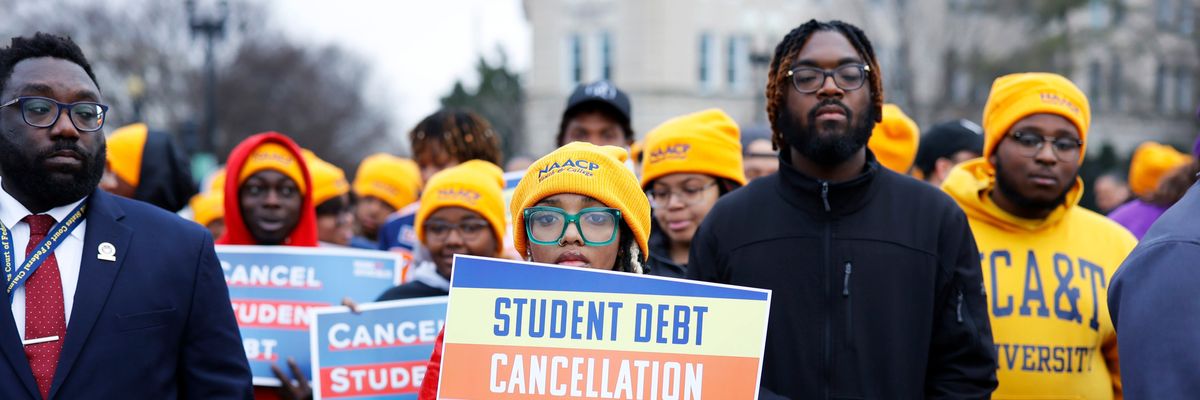Borrowers, advocates, and lawmakers converged on the steps of the U.S. Supreme Court on Monday night and Tuesday morning to defend President Joe Biden's stalled student debt relief plan as justices prepared to consider a pair of right-wing challenges to the popular proposal.
Attendees argued that Biden's move to erase up to $20,000 in student debt for federal borrowers with individual incomes under $125,000 and modify the income-driven repayment program is just, legal, and necessary. Although it falls short of progressives' demands for universal cancellation, speakers made clear that the White House's plan is key to improving economic security.
"You should not have to face financial ruin because you want a damn education!" Sen. Bernie Sanders of Vermont said during Tuesday morning's rally. "Education, from child care to graduate school, is a human right. It should be free to all."
"Today we say to the Supreme Court, listen to the needs of millions of struggling people," Sanders added. "Do the right thing. Support Biden's proposal to cancel student debt."
"President Biden's executive authority to provide student debt relief to borrowers is abundantly clear."
After Monday night's rally, some campaigners planned to camp out overnight in a bid to secure seats in the courtroom for Tuesday's oral arguments, which began at 10:00 am ET.
In both Biden v. Nebraska—brought by the Republican-led states of Nebraska, Missouri, Arkansas, Iowa, Kansas, and South Carolina—and Department of Education v. Brown—filed with the support of billionaires by a pair of plaintiffs who claim they were unfairly excluded from relief—the right-wing-controlled Supreme Court will decide whether Biden's plan exceeds the U.S. Department of Education's (DOE) authority and whether the lawsuits have legal standing.
In a Tuesday statement released ahead of the hearing, Democratic Rep. Cori Bush of Missouri said, "Today, far-right Republican attorneys general will bring baseless and politically motivated arguments to the Supreme Court in opposition to providing student debt relief promised to 40 million borrowers across our country."
"Regardless," said Bush, "President Biden's executive authority to provide student debt relief to borrowers is abundantly clear—just look at the facts."
Bush continued:
Fact: The basis of the Republican AG's case relies on the claim that this relief plan threatens the profits of loan servicers such as MOHELA and states will be financially injured. Yet, in response to an October letter I sent to MOHELA, they denied involvement in the case and discredited Republicans by stating that they don’t operate to make profits and remain committed to complying with contractual obligations set forth by the U.S. Department of Education.
Fact: Republicans claim that states, like Missouri, also rely on revenue from loan servicers like MOHELA. Yet, MOHELA hasn’t paid their bills to the state in over a decade and owes over $100 million to the state of Missouri.
Fact: President Biden's student debt relief plan would provide 40 million borrowers across our country—including 144,000 of my constituents—with life-changing financial relief. Following the economic devastation of the pandemic, we need transformative policy solutions to foster an equitable economic recovery.
"I know what it's like to carry crushing student debt and to have to make impossible choices between paying rent or paying an exorbitant student loan bill," said Bush. "And I've heard from people across the country who have shared how this relief would change their lives—from being able to afford child care, to paying their medical bills, to being able to put food on the table."
"The facts are clear, and I implore the Supreme Court to affirm the president's executive authority to cancel up to $20,000 in student debt," she added. "I'm confident the Biden-Harris administration's plan will withstand these hurdles and provide the much-needed relief to borrowers."
Right-wing lawmakers and activists filed numerous lawsuits after the White House announced its student debt cancellation bid in August. Applications for relief closed in November after a federal judge appointed by former President Donald Trump blocked Biden's plan. At the time, 26 million borrowers had already applied for or were automatically eligible for relief, and 16 million applications were given the green light and sent to loan servicers.
While GOP members of Congress argue that student debt relief is a regressive policy whose benefits would flow disproportionately to wealthy households, DOE data released earlier this month dispels that myth. According to a Politico analysis of the data, over 98% of people who applied before the portal was frozen reside in ZIP codes where the average per-capita income is under $75,000. Nearly two-thirds of applicants live in neighborhoods where the average person makes less than $40,000 per year.
With his relief measures obstructed, Biden extended the pause on federal student loan repayments—a measure that was introduced at the beginning of the Covid-19 pandemic in March 2020 and had been set to expire on December 31, 2022—through June 30, 2023. Payments are set to restart 60 days after that date, or 60 days after the high court hands down its decision, whichever comes first.
The Debt Collective, however, tweeted Monday night: "We're not paying that damn student debt no matter what the Supreme Court and its corrupted judges say."
